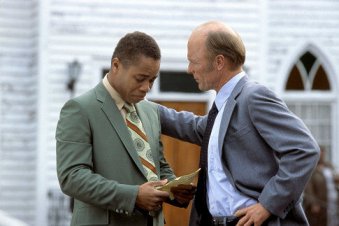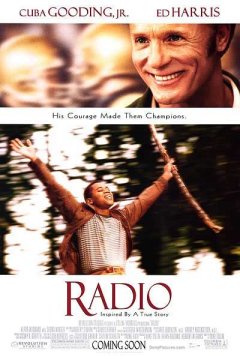|
Radio
There
will be many, many of you out there who will go see Radio,
and love it.
Your hearts
will be warmed by Cuba Gooding Jr.'s portrayal of Radio, a
mentally handicapped man who becomes the heart and soul of
a South Carolina high school. You'll get choked up when Ed
Harris, as the school's gruff head football coach, befriends
Radio and learns about acceptance and caring. Your eyes will
sting when Harris' Coach Jones reluctantly leaves Radio behind
as the team boards the bus for an away game; and boy oh boy,
you'll burst into whopping big tears when Radio faces the
biggest tragedy of his life.
This is exactly what they want you to feel.
They want
you to be so distracted by Gooding's admittedly excellent
performance, that you don't notice the weak story and plodding
pacing. They want you to get all mushy inside when Coach Jones
brings joy to Radio's empty life without realizing that he
doesn't have to sacrifice or struggle to do so.
When James
Horner's score sighs and swells, you're meant to go all gooey,
and ignore the fact that the music is underscoring nothing.
There is no drama here. What we have instead is a shameless
Hollywood tearjerker designed to push all of our buttons.
It's Rudy and Remember the Titans stirred in
with ample doses of Forrest Gump.
The Hollywood Cuisinart is out there, predigesting your movie
so it goes down easier.
And audiences will eat it up. They'll walk out of the theatre
inspired to be nicer to their fellow man, or call their moms,
or whatever. This sounds good, but it won't last. Most will
forget the resolutions they made during the credits; they'll
forget Radio's sweet, simple message, and they'll return to
their old puppy-kicking ways. Because no matter how much it
wants to be, Radio is not the kind of movie that changes
lives.
Although
the movie is titled Radio, the real hero of the piece
is Coach Jones, a tough, fatherly high school football coach.
He's respected by his team, idolized by the town, and adored
by his lovely wife and daughter. Although he has a tendency
to neglect his family during football season, his wife is
so understanding, it never becomes an issue.
 Radio
has been a fixture of the town, passing by the high school
pushing his shopping cart for years. After an ugly incident
where some members of the football team harass him, Coach
Jones takes a personal interest in the young man, christening
him "Radio" since at first it's the only thing he
can get him to say. Radio
has been a fixture of the town, passing by the high school
pushing his shopping cart for years. After an ugly incident
where some members of the football team harass him, Coach
Jones takes a personal interest in the young man, christening
him "Radio" since at first it's the only thing he
can get him to say.
To the
chagrin and concern of both the team and the school's principal,
played by Alfre Woodard, Radio starts attending games, football
practice, and even assisting the coach in class. Though at
first most are wary, a musical montage shows Radio gaining
acceptance from nearly everyone in town.
We even
get a sequence where Radio teaches a grouchy cop the true
meaning of Christmas. Hooray.
The biggest
flaw in the structure of the film is its almost total lack
of conflict. Every time an obstacle comes up it is immediately
dealt with, with a minimum of fuss. Coach Jones is clearly
doing the right thing for the right reasons, though it means
he spends less time with his family, they don't mind, 'cuz
they love Radio too. The villain of the film, the win-at-all-costs
father of one of the football players, never seems to be an
actual threat to Radio or Coach Jones. Even when the possibility
of Radio being sent to a home rears its head, the problem
is swiftly resolved off screen. I kept waiting for some major
plot point or conflict to occur, and it never did.
I should
point out, for those who don't know, that Radio is
a true story. Radio and Coach Jones are both alive and well
and living in South Carolina. Perhaps the filmmakers were
so concerned with being faithful to the lives of these people
that they were unwilling to write any real drama into the
movie. As it stands, Radio lacks the conflict to make
a decent feature film. It's a sweet story better suited to
The Wonderful World of Disney.
Rating:

|

 Radio
has been a fixture of the town, passing by the high school
pushing his shopping cart for years. After an ugly incident
where some members of the football team harass him, Coach
Jones takes a personal interest in the young man, christening
him "Radio" since at first it's the only thing he
can get him to say.
Radio
has been a fixture of the town, passing by the high school
pushing his shopping cart for years. After an ugly incident
where some members of the football team harass him, Coach
Jones takes a personal interest in the young man, christening
him "Radio" since at first it's the only thing he
can get him to say. 




